英语听力
- 格式:doc
- 大小:153.00 KB
- 文档页数:45
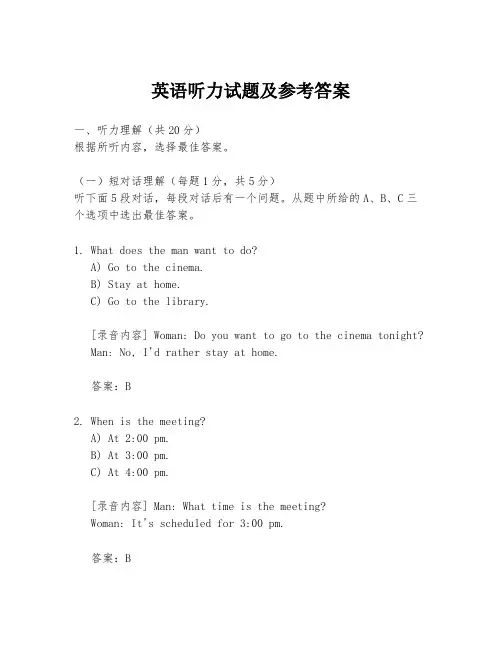
英语听力试题及参考答案一、听力理解(共20分)根据所听内容,选择最佳答案。
(一)短对话理解(每题1分,共5分)听下面5段对话,每段对话后有一个问题。
从题中所给的A、B、C三个选项中选出最佳答案。
1. What does the man want to do?A) Go to the cinema.B) Stay at home.C) Go to the library.[录音内容] Woman: Do you want to go to the cinema tonight? Man: No, I'd rather stay at home.答案:B2. When is the meeting?A) At 2:00 pm.B) At 3:00 pm.C) At 4:00 pm.[录音内容] Man: What time is the meeting?Woman: It's scheduled for 3:00 pm.答案:B3. What is the weather like?A) Sunny.B) Rainy.C) Cloudy.[录音内容] Man: What's the weather like today? Woman: It's cloudy and a bit chilly.答案:C4. What does the woman suggest?A) Taking a taxi.B) Walking.C) Waiting for the bus.[录音内容] Man: I'm late for work.Woman: Why don't you take a taxi?答案:A5. What is the man's opinion about the book?A) It's too difficult.B) It's interesting.C) It's too long.[录音内容] Woman: How do you find the book?Man: It's quite interesting.答案:B(二)长对话理解(每题2分,共10分)听下面一段较长的对话,对话后有5个问题。
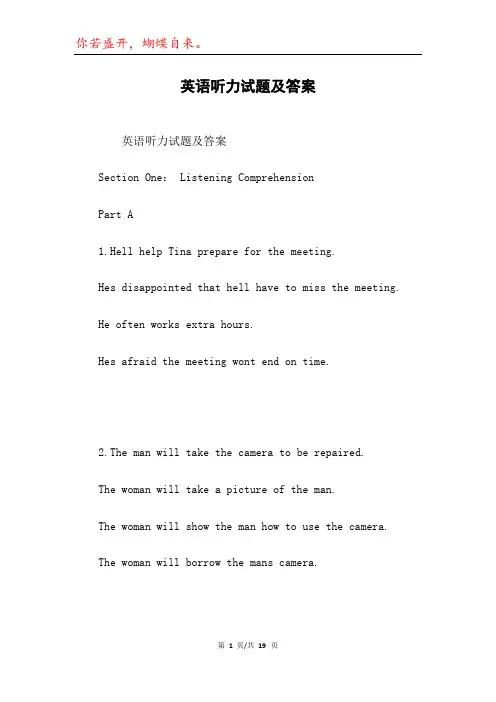
英语听力试题及答案英语听力试题及答案Section One: Listening ComprehensionPart A1.Hell help Tina prepare for the meeting.Hes disappointed that hell have to miss the meeting. He often works extra hours.Hes afraid the meeting wont end on time.2.The man will take the camera to be repaired.The woman will take a picture of the man.The woman will show the man how to use the camera. The woman will borrow the mans camera.3.Hed like to apply for a replacement card.He needed to see a doctor two weeks ago.Hes pleased that the woman found the card.Hes glad he was finally able to get an appointment.4.She doesnt understand the mans questionShe doesnt have time to repeat the explanation now. She doesnt mind answering questionsShell return soon.5. A) The woman doesnt accept the mans apology.The woman wasnt bothered by the delay.The man didnt realize the woman was waiting.The man waited a long time for the bus.6.The coat isnt warm enough to wear in cold weather. She bought the coat last winter.She needs to have the coat cleaned before next winter. The coat is the only warm coat she owns.7.She wont be a candidate next year.She doesnt believe the news.The news doesnt upset her.The news will disappoint Mary.8.Try to find the womans roommate.Buy tickets for the film festival.Give the woman a ride to the bookstore.Get a schedule for the woman.9.He doesnt know many composers of claassical musicAnnie might spend a lot of money on classical music.He has known Annies neighbor for many years.Annie should try not to get sick.10.Shell probably be late for her appointment with the dentistShe wont be riding with her class to the museum.Shell meet the man in front of the library.She forgot that her class was going to the museum.11.She thinks it will rain today.Her hobby is collecting coins.Shell change the money for the man.Shes keeping the money for an emergency.12.He studies engineering.He has only recently become interested in philosophy. He wasnt at the lecture.He thinks Professor Warner is a good teacher.13.The reports should have been completed by today. Only the first part of the report is due next Friday. Some students didnt finish their reports on time.Some students havent started their reports yet.14.Spend thirty dollars on the painting. Sell one of his paintings.Look for a less expensive painting.Buy the painting without the frame.15.Exercise less frequently.Take less medicine each day.Visit him as soon as possible.Take a new kind of headache medicine.16.His job starts next week.Hes eager to start his new job.His professor was mistaken about the job. He believes the job interview went well.17.Janet didnt attend.Janets friends did a lot of the work.The man wasnt invited.It was canceled at the last minute.18.Hes looking for another roommate.Hes sharing the room with his brothers.He hasnt met his roommate yet.He doesnt think the room is too small.19.The train to Middletown is often late.The man has missed the train to Middletown.The next train to Middletown leaves in eleven minutes.Trains dont stop at Middletown in the evening.20.Wear his suit.Prepare for cold weather.Find out whos going to the party.Dress informally.21.Shes not sure shell be seeing Julia.Shell phone Julia later in the week.She doesnt know Julias phone number.She doesnt think Julia knows about registration.22.Most of them were written near the end of the authors lifetime.Many of them arent included in the librarys collection.They were all highly praised by literary critics.Many readers like to collect them.23.The man is a good student.The man shouldnt work overtime.She wishes that she had a job.She doesnt want to work with the man.24.She doesnt expect to meet with Kevin today.She cant wait any longer for Kevin.Kevin is often late.Kevin has probably overslept.25.The books are all required for the history course.Some of the books are for courses other than history.He plans to read more than just the books that are required. Hes worried he may not finish the required reading.26.Watch a movie on television.Go out to dinner with the man.Go to the tennis court.Play in the tournament.27.She wishes she could help the man.She has a bigger problem than the man has.She knows a mechanic who can fix the mans car.The man should buy a new car.28.Shes pleased the mans schedule wont change.She cant offer the man a flexible schedule.Whoever works at the front desk must have a flexible schedule.She doesnt need anyone else to work at the front desk.29.He wants the woman to repeat her question.He agrees with the woman.He wants to talk about the movie.He wants to see the movie again.30.Professor Lane is liked by her students.Professor Lane never gives high grades.The man deserves the grade he received.The man should phone Professor Lane to thank her.PartB31.How different kinds of pepper are produced. Why white pepper is superior to dishes.How the pepper plant is grown.How various peppers are used in cooking.32.He read about it in a cookbook.He grows his own herbs and spices.He heard about it from a friend.He studied it in cooking school.33.Its preserved in liquid.The skin is removed.Its dried in the sun.Its freeze-dried.34.Its more pure than other types of pepper.It helps maintain the color of certain black pepper. It has a fruity flavor.Its easier to grow.35.He answered all her questions correctly.He received a good grade in cooking class.She likes what he has just cooked.Shes impressed with his knowledge.36.A story in prose.A poem that rhymes.A translation of a short literary work.A journal about the process of writing.37.The class has been assigned to read than it is in English.He was able to read it in French.He isnt sure its available in English.He thinks its an example of what the wants.38.Its pronounced differently in French it.To write without using it is difficult both in English andin French.Every word in the French authors professor book contained it.Its commonly used in English to make poetry rhyme.PartC39.As the result of the moisture in the Earths atmosphere. As the result of the Earths rotation.As the horizontal movement of air.As the vertical movement of air.40.Its the ultimate cause of winds.It causes vertical movements of air.It reduces differences in air pressure.Its used to predict weather patterns.41.Air pressure.Temperature.Humidity.Wind direction.42.How winds affect temperature.Reasons for sudden increases in wind.The origin of storm systems.How vertical air movement influences weather.43.Factors that affect the ability to remember. The influence of childhood memories on adulthood.A proposal for future psychological research.Benefits of a busy lifestyle.44.The need to exercise the memory.How the brain differs from other body tissues.The unconscious learning of a physical activity.How nerves control body movement.45.Repeat it aloud.Write it down.Make a mental picture of it.practice recalling it.46.Ask questions about the assigned reading.Give an example of active learning.Explain recent research on recalling childhood memories. Make an assignment for the next class session.47.How they behave toward ants from other nests.What they usually eat.Why they are becoming extinct.Why they were brought to California.48.They protect Argentine ants that live in neighboring nests.They gather food with Argentine ants from other nests.They fight Argentine ants from other nests.They generally build larger nests than other ant species do.49.They attack members of their own nests.They recruit ants from other species into their nests. They form large colonies made of several nests.They hide from insects that attack their nests.50.They share the same few ancestors.They cant be distinguished from native Californian ants. They are evolving faster than native Californian ants. Their future survival is in doubt.答案BCCCB ACDBB DABDB CBDBD ABBCC CDBBC ADCBC ADBCA DDAAC BACCA 【英语听力试题及答案】文档内容到此结束,欢迎大家下载、修改、丰富并分享给更多有需要的人。
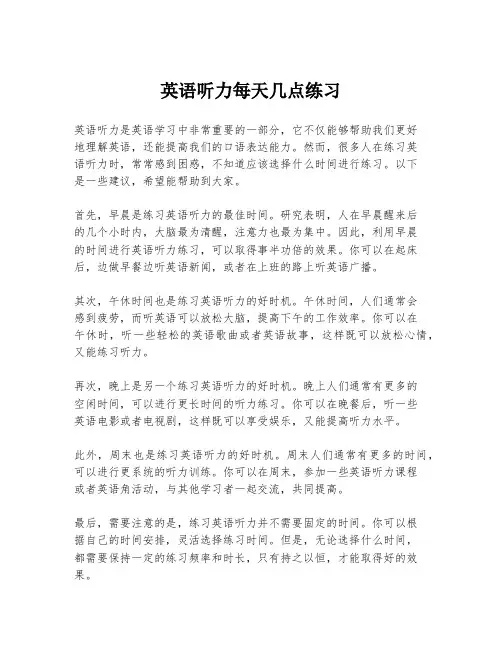
英语听力每天几点练习英语听力是英语学习中非常重要的一部分,它不仅能够帮助我们更好地理解英语,还能提高我们的口语表达能力。
然而,很多人在练习英语听力时,常常感到困惑,不知道应该选择什么时间进行练习。
以下是一些建议,希望能帮助到大家。
首先,早晨是练习英语听力的最佳时间。
研究表明,人在早晨醒来后的几个小时内,大脑最为清醒,注意力也最为集中。
因此,利用早晨的时间进行英语听力练习,可以取得事半功倍的效果。
你可以在起床后,边做早餐边听英语新闻,或者在上班的路上听英语广播。
其次,午休时间也是练习英语听力的好时机。
午休时间,人们通常会感到疲劳,而听英语可以放松大脑,提高下午的工作效率。
你可以在午休时,听一些轻松的英语歌曲或者英语故事,这样既可以放松心情,又能练习听力。
再次,晚上是另一个练习英语听力的好时机。
晚上人们通常有更多的空闲时间,可以进行更长时间的听力练习。
你可以在晚餐后,听一些英语电影或者电视剧,这样既可以享受娱乐,又能提高听力水平。
此外,周末也是练习英语听力的好时机。
周末人们通常有更多的时间,可以进行更系统的听力训练。
你可以在周末,参加一些英语听力课程或者英语角活动,与其他学习者一起交流,共同提高。
最后,需要注意的是,练习英语听力并不需要固定的时间。
你可以根据自己的时间安排,灵活选择练习时间。
但是,无论选择什么时间,都需要保持一定的练习频率和时长,只有持之以恒,才能取得好的效果。
总之,英语听力练习是一个长期的过程,需要我们不断地努力和坚持。
只要我们能够合理安排时间,选择适合自己的练习方式,就一定能够提高自己的英语听力水平。
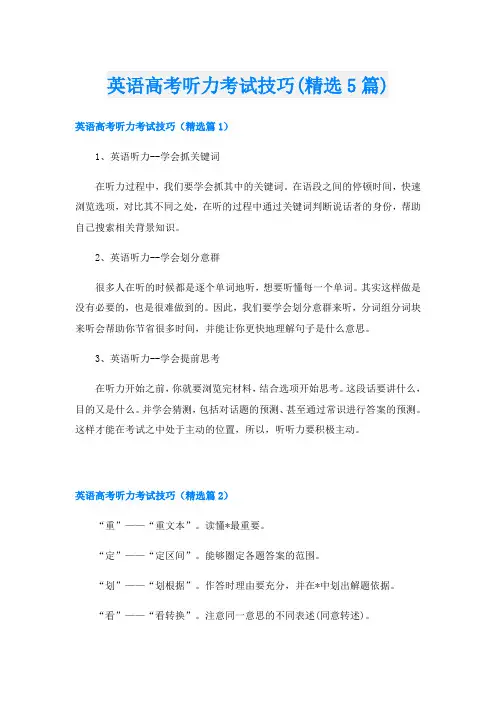
英语高考听力考试技巧(精选5篇)英语高考听力考试技巧(精选篇1)1、英语听力--学会抓关键词在听力过程中,我们要学会抓其中的关键词。
在语段之间的停顿时间,快速浏览选项,对比其不同之处,在听的过程中通过关键词判断说话者的身份,帮助自己搜索相关背景知识。
2、英语听力--学会划分意群很多人在听的时候都是逐个单词地听,想要听懂每一个单词。
其实这样做是没有必要的,也是很难做到的。
因此,我们要学会划分意群来听,分词组分词块来听会帮助你节省很多时间,并能让你更快地理解句子是什么意思。
3、英语听力--学会提前思考在听力开始之前,你就要浏览完材料,结合选项开始思考。
这段话要讲什么,目的又是什么。
并学会猜测,包括对话题的预测、甚至通过常识进行答案的预测。
这样才能在考试之中处于主动的位置,所以,听听力要积极主动。
英语高考听力考试技巧(精选篇2)“重”——“重文本”。
读懂*最重要。
“定”——“定区间”。
能够圈定各题答案的范围。
“划”——“划根据”。
作答时理由要充分,并在*中划出解题依据。
“看”——“看转换”。
注意同一意思的不同表述(同意转述)。
“防”——“防陷井”。
锁定是“true”还是“not true”,辨明形近词。
“读”——“读全项”。
做判断时要通读每一题的所有选项,区分鉴别,选择最佳。
很多同学在英语阅读理解中,都错在了关键的第一步——审题上。
那么到底如何看题干,我们应该看哪里?大部分同学知道,用时间、大写词去定位,但其实这只是最基本的定位信息。
A. 看似松散,一般每篇只有四个问题,实则考查对*中心思想的把握能力。
B. 看似粗线条,根据文中具体信息便可判断正确答案,实则考查句意理解的精确度。
C. 抓住关键句,每段的首句大抵是本段的关键句。
英语高考听力考试技巧(精选篇3)1、集中注意力考生在听英语听力的时候,要稳定自己的心理,这样才能发挥出自己的正常的水平。
而过于紧张焦急的情绪则会容易产生恐惧心理,使听力的反应速度变慢,对把握信息的准确度大打折扣。
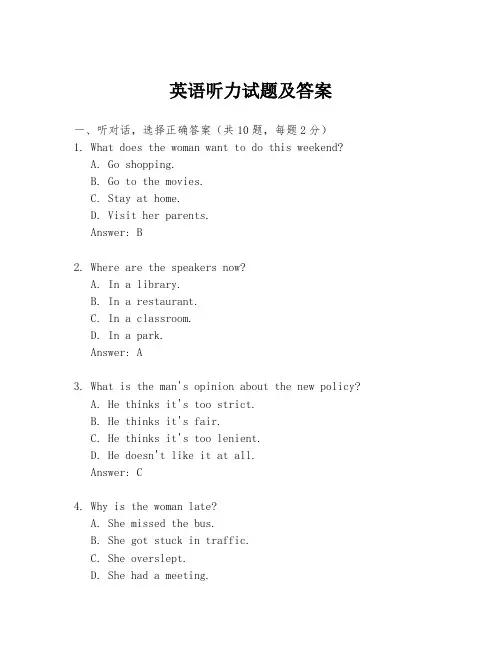
英语听力试题及答案一、听对话,选择正确答案(共10题,每题2分)1. What does the woman want to do this weekend?A. Go shopping.B. Go to the movies.C. Stay at home.D. Visit her parents.Answer: B2. Where are the speakers now?A. In a library.B. In a restaurant.C. In a classroom.D. In a park.Answer: A3. What is the man's opinion about the new policy?A. He thinks it's too strict.B. He thinks it's fair.C. He thinks it's too lenient.D. He doesn't like it at all.Answer: C4. Why is the woman late?A. She missed the bus.B. She got stuck in traffic.C. She overslept.D. She had a meeting.Answer: B5. What are the speakers talking about?A. A new book.B. A new movie.C. A new restaurant.D. A new job.Answer: A6. What time does the train leave?A. At 6:30.B. At 7:00.C. At 7:30.D. At 8:00.Answer: C7. How much does the woman need to pay for the dress?A. $50.B. $75.C. $100.D. $125.Answer: B8. What is the weather like today?A. Sunny.B. Rainy.C. Cloudy.D. Snowy.Answer: A9. Who will be in charge of the project?A. The man.B. The woman.C. The boss.D. The assistant.Answer: A10. What is the woman's major?A. Biology.B. Chemistry.C. Physics.D. Mathematics.Answer: D二、听短文,完成信息填空(共5题,每题2分)11. The lecture is about ________.Answer: environmental protection12. The speaker suggests that people should ________.Answer: reduce their carbon footprint13. One of the ways to protect the environment is by ________. Answer: recycling14. The speaker mentions that deforestation leads to ________. Answer: loss of biodiversity15. The lecture will be held at ________.Answer: the university auditorium三、听长对话,回答问题(共5题,每题2分)16. What is the main topic of the conversation?Answer: Travel plans for the upcoming vacation17. Where does the man want to go?Answer: The man wants to go to the beach.18. What is the woman's concern about traveling during the peak season?Answer: The woman is concerned about the high cost and crowded places.19. What does the man suggest as an alternative?Answer: The man suggests traveling during the off-peak season.20. What is the woman's final decision?Answer: The woman decides to consider the man's suggestion.。
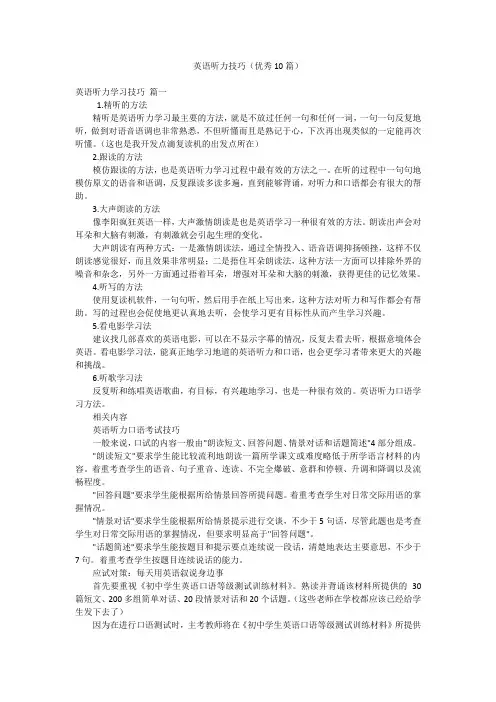
英语听力技巧(优秀10篇)英语听力学习技巧篇一1.精听的方法精听是英语听力学习最主要的方法,就是不放过任何一句和任何一词,一句一句反复地听,做到对语音语调也非常熟悉,不但听懂而且是熟记于心,下次再出现类似的一定能再次听懂。
(这也是我开发点滴复读机的出发点所在)2.跟读的方法模仿跟读的方法,也是英语听力学习过程中最有效的方法之一。
在听的过程中一句句地模仿原文的语音和语调,反复跟读多读多遍,直到能够背诵,对听力和口语都会有很大的帮助。
3.大声朗读的方法像李阳疯狂英语一样,大声激情朗读是也是英语学习一种很有效的方法。
朗读出声会对耳朵和大脑有刺激,有刺激就会引起生理的变化。
大声朗读有两种方式:一是激情朗读法,通过全情投入、语音语调抑扬顿挫,这样不仅朗读感觉很好,而且效果非常明显;二是捂住耳朵朗读法,这种方法一方面可以排除外界的噪音和杂念,另外一方面通过捂着耳朵,增强对耳朵和大脑的刺激,获得更佳的记忆效果。
4.听写的方法使用复读机软件,一句句听,然后用手在纸上写出来,这种方法对听力和写作都会有帮助。
写的过程也会促使地更认真地去听,会使学习更有目标性从而产生学习兴趣。
5.看电影学习法建议找几部喜欢的英语电影,可以在不显示字幕的情况,反复去看去听,根据意境体会英语。
看电影学习法,能真正地学习地道的英语听力和口语,也会更学习者带来更大的兴趣和挑战。
6.听歌学习法反复听和练唱英语歌曲,有目标,有兴趣地学习,也是一种很有效的。
英语听力口语学习方法。
相关内容英语听力口语考试技巧一般来说,口试的内容一般由"朗读短文、回答问题、情景对话和话题简述"4部分组成。
"朗读短文"要求学生能比较流利地朗读一篇所学课文或难度略低于所学语言材料的内容。
着重考查学生的语音、句子重音、连读、不完全爆破、意群和停顿、升调和降调以及流畅程度。
"回答问题"要求学生能根据所给情景回答所提问题。
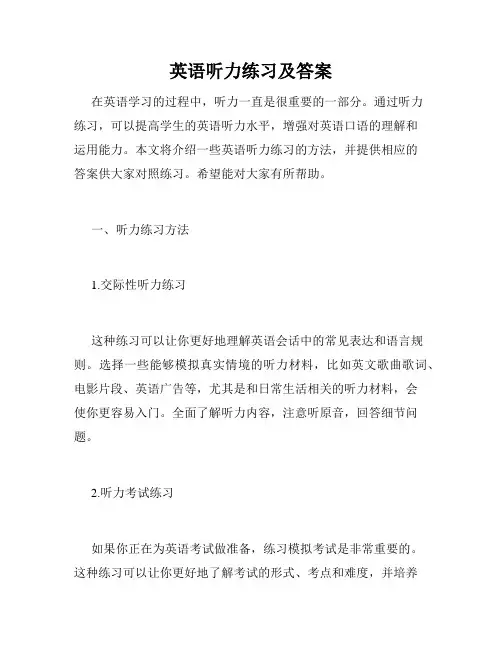
英语听力练习及答案在英语学习的过程中,听力一直是很重要的一部分。
通过听力练习,可以提高学生的英语听力水平,增强对英语口语的理解和运用能力。
本文将介绍一些英语听力练习的方法,并提供相应的答案供大家对照练习。
希望能对大家有所帮助。
一、听力练习方法1.交际性听力练习这种练习可以让你更好地理解英语会话中的常见表达和语言规则。
选择一些能够模拟真实情境的听力材料,比如英文歌曲歌词、电影片段、英语广告等,尤其是和日常生活相关的听力材料,会使你更容易入门。
全面了解听力内容,注意听原音,回答细节问题。
2.听力考试练习如果你正在为英语考试做准备,练习模拟考试是非常重要的。
这种练习可以让你更好地了解考试的形式、考点和难度,并培养你的心理素质和答题技巧。
选择几个较为权威且在考试中出现频率较高的试卷材料进行练习,并注意自己的时间管理和答题技巧。
3.听力口语练习听力口语练习是比较综合的听力练习方式,可以帮助你在理解英语口语并在口语中正确运用学到的单词和语法方面得到提高。
选择一些和你的英语水平相当的材料,注意准确地听出其中的每一个单词,并尝试复述其中的对话和内容。
二、听力练习答案以下提供一些英语听力练习材料及其相应的练习答案,供大家参考。
1.听力材料:一段简短的英语广告Hi, my name is Jane. I work in ABC Company. We are now offering a new product – a smartphone with multi-functions. It can help you not only make phone calls but also take photos, videos and sendmessages. It can even tell you the weather condition! Come and try our new phone, you will love it!答案:1. What is the name of the speaker? -Jane2. Where does Jane work? -ABC Company3. What is the new product offered by ABC Company? -a smartphone with multi-functions4. What can the smartphone do besides making phone calls? -take photos, videos and send messages5. What is the extra function of this phone? -It can even tell you the weather condition!2.听力材料:一段英语电影片段Hi, I’m Jack. Nice to meet you.Hi, I’m Rose, pleased to meet you, too.So what do you do? Are you a student?No, I’m a writer.Really? I love reading! What do you write?I’ve written a few short stories and some articles for a magazine. It’s nothing big, though.I’m sure they’re great. What kind of sto ries do you write?I mostly write about my own experiences and the people I’ve met. I think it’s important to tell the truth.答案:1. What is the name of the male character? -Jack2. What is the name of the female character? -Rose3. What does Jack do? -unspecified4. What is Rose’s occupation? -writer5. What is the subject matter of Rose’s writing? -mostly about her own experiences and the people she’s met三、结语以上是几种常见的英语听力练习方法和相应的练习答案,希望对大家进行英语听力练习时有所帮助。
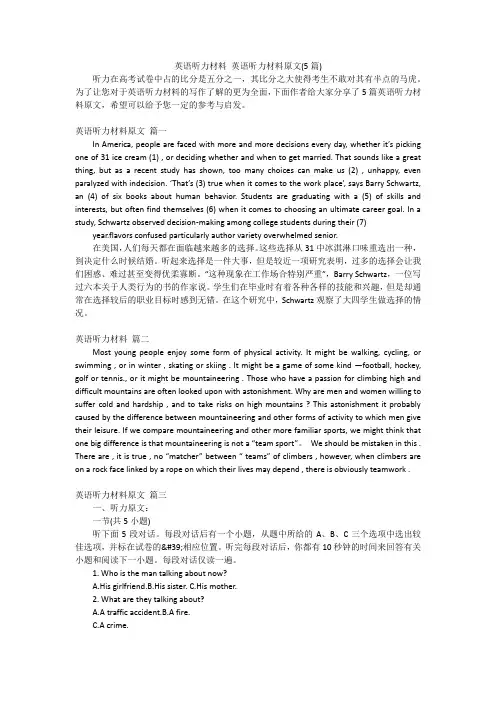
英语听力材料英语听力材料原文(5篇)听力在高考试卷中占的比分是五分之一,其比分之大使得考生不敢对其有半点的马虎。
为了让您对于英语听力材料的写作了解的更为全面,下面作者给大家分享了5篇英语听力材料原文,希望可以给予您一定的参考与启发。
英语听力材料原文篇一In America, people are faced with more and more decisions every day, whether it’s picking one of 31 ice cream (1) , or deciding whether and when to get married. That sounds like a great thing, but as a recent study has shown, too many choices can make us (2) , unhappy, even paralyzed with indecision. ‘That’s (3) true when it comes to the work place’, says Barry Schwartz, an (4) of six books about human behavior. Students are graduating with a (5) of skills and interests, but often find themselves (6) when it comes to choosing an ultimate career goal. In a study, Schwartz observed decision-making among college students during their (7) year.flavors confused particularly author variety overwhelmed senior.在美国,人们每天都在面临越来越多的选择。
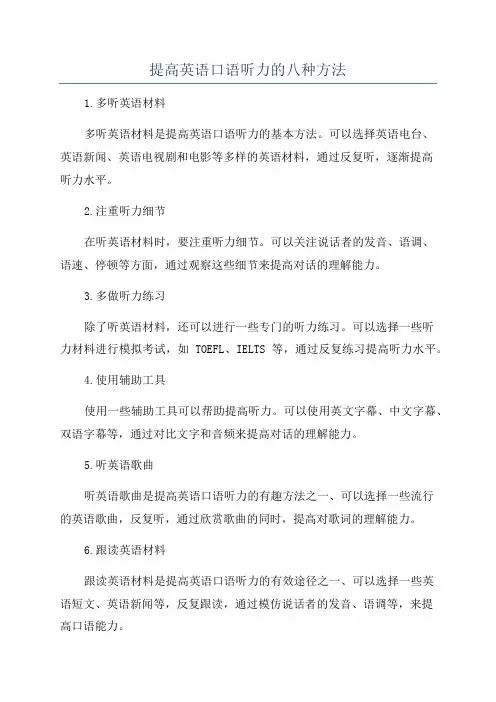
提高英语口语听力的八种方法
1.多听英语材料
多听英语材料是提高英语口语听力的基本方法。
可以选择英语电台、
英语新闻、英语电视剧和电影等多样的英语材料,通过反复听,逐渐提高
听力水平。
2.注重听力细节
在听英语材料时,要注重听力细节。
可以关注说话者的发音、语调、
语速、停顿等方面,通过观察这些细节来提高对话的理解能力。
3.多做听力练习
除了听英语材料,还可以进行一些专门的听力练习。
可以选择一些听
力材料进行模拟考试,如TOEFL、IELTS等,通过反复练习提高听力水平。
4.使用辅助工具
使用一些辅助工具可以帮助提高听力。
可以使用英文字幕、中文字幕、双语字幕等,通过对比文字和音频来提高对话的理解能力。
5.听英语歌曲
听英语歌曲是提高英语口语听力的有趣方法之一、可以选择一些流行
的英语歌曲,反复听,通过欣赏歌曲的同时,提高对歌词的理解能力。
6.跟读英语材料
跟读英语材料是提高英语口语听力的有效途径之一、可以选择一些英
语短文、英语新闻等,反复跟读,通过模仿说话者的发音、语调等,来提
高口语能力。
7.练习听力速度
练习听力速度是提高英语口语听力的重要方法之一、可以选择一些较快的英语材料,如演讲、口语对话等,通过反复听这些较快的材料,逐渐提高听力速度。
8.制定计划并持之以恒
总结起来,提高英语口语听力需要多听英语材料、注重听力细节、多做听力练习、使用辅助工具、听英语歌曲、跟读英语材料、练习听力速度以及制定计划并持之以恒。
通过这些方法的不断实践,相信大家一定能够提高自己的英语口语听力水平。
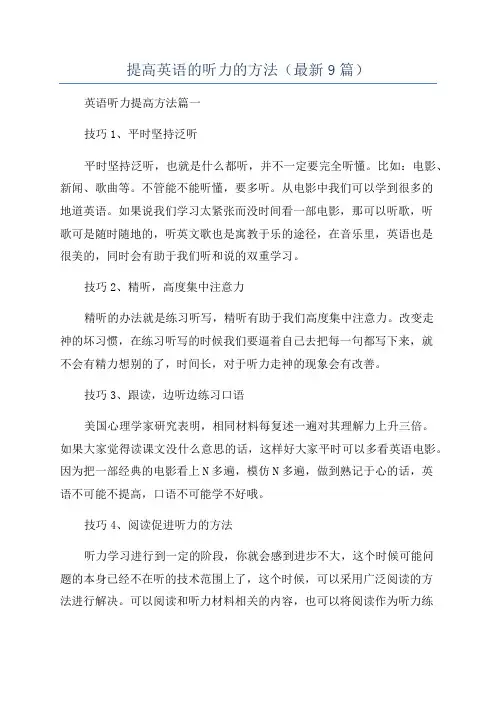
提高英语的听力的方法(最新9篇)英语听力提高方法篇一技巧1、平时坚持泛听平时坚持泛听,也就是什么都听,并不一定要完全听懂。
比如:电影、新闻、歌曲等。
不管能不能听懂,要多听。
从电影中我们可以学到很多的地道英语。
如果说我们学习太紧张而没时间看一部电影,那可以听歌,听歌可是随时随地的,听英文歌也是寓教于乐的途径,在音乐里,英语也是很美的,同时会有助于我们听和说的双重学习。
技巧2、精听,高度集中注意力精听的办法就是练习听写,精听有助于我们高度集中注意力。
改变走神的坏习惯,在练习听写的时候我们要逼着自己去把每一句都写下来,就不会有精力想别的了,时间长,对于听力走神的现象会有改善。
技巧3、跟读,边听边练习口语美国心理学家研究表明,相同材料每复述一遍对其理解力上升三倍。
如果大家觉得读课文没什么意思的话,这样好大家平时可以多看英语电影。
因为把一部经典的电影看上N多遍,模仿N多遍,做到熟记于心的话,英语不可能不提高,口语不可能学不好哦。
技巧4、阅读促进听力的方法听力学习进行到一定的阶段,你就会感到进步不大,这个时候可能问题的本身已经不在听的技术范围上了,这个时候,可以采用广泛阅读的方法进行解决。
可以阅读和听力材料相关的内容,也可以将阅读作为听力练习的辅助方法,大量地阅读小说、杂志、网络文章、新闻报道等自己感兴趣的内容。
阅读是积累词汇的最有效的方法之一提高中考英语听力方法第一步:试听文题,调整心理第二步:积极读题预测,细节莫失选项是听力理解的关键,它可以帮助我们预测将要听到的材料的内容,也可提示所听的重点。
因此听音前五分钟,要看清大小题目要求、问题与选项,不要放过任何一个细节。
在浏览问题和选项时,要尽可能对文章内容和试题答案进行预测,听录音时只要验证自己的预测就可以了例如:1、 This article(文章) is talking about _________ names.A. EnglishB. AmericanC. ChineseD. School2、In “John Henry Brown”,John is the _________ name.A. familyB. firstC. secondD. full3、 English people often put Mr, Mrs and Miss before the_________ name.A. familyB. secondC. firstD. full4、 Many English people have _________ names.A. twoB. threeC. fourD. only one通过阅读题目及选项,我们可以获得这样的信息:这篇听力材料讲的是关于英、美国家人的姓名的短文。
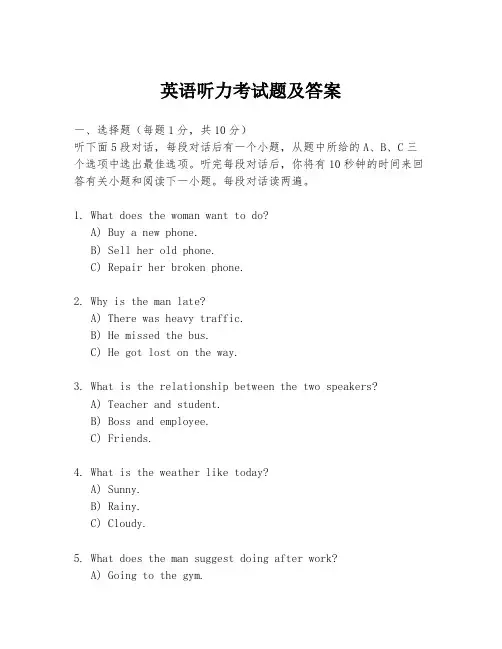
英语听力考试题及答案一、选择题(每题1分,共10分)听下面5段对话,每段对话后有一个小题,从题中所给的A、B、C三个选项中选出最佳选项。
听完每段对话后,你将有10秒钟的时间来回答有关小题和阅读下一小题。
每段对话读两遍。
1. What does the woman want to do?A) Buy a new phone.B) Sell her old phone.C) Repair her broken phone.2. Why is the man late?A) There was heavy traffic.B) He missed the bus.C) He got lost on the way.3. What is the relationship between the two speakers?A) Teacher and student.B) Boss and employee.C) Friends.4. What is the weather like today?A) Sunny.B) Rainy.C) Cloudy.5. What does the man suggest doing after work?A) Going to the gym.B) Watching a movie.C) Having dinner together.二、填空题(每空1分,共10分)听下面一段较长的对话,然后从所给选项中选出正确的词或短语填入空白处。
对话读两遍。
W: Hi, John, how are you doing?M: Hi, Mary. I'm fine, thanks. I just got a new job at a___6___.W: Oh, congratulations! What kind of company is it?M: It's a software development company. I'm really excited about it.W: That's great. When do you start?M: I start ___7___.W: I hope you enjoy your new job. Let's go out for lunch to celebrate.M: Sounds good. Let's meet at the restaurant at 12:30.选项:A) bookstoreB) restaurantC) software companyD) next MondayE) tomorrow三、简答题(每题2分,共10分)听下面一段独白,然后回答后面的问题。
英语听力的方法技巧大全1.提前预习:在听一些听力材料之前,先阅读相关的文本材料,了解大致内容,熟悉相关的词汇和语法结构,可以帮助你在听力过程中更好地理解和记忆。
2.注意语调和重音:在听英语时,要注意说话者的语调和重音。
语调可以帮助你区分句子的不同部分,重音可以帮助你理解重要信息和关键词。
3.多听各种不同类型的材料:通过听各种不同类型的材料,如新闻、访谈、电影、广播等,可以帮助你熟悉不同的口音、语速和语言风格。
4.多练习听力:听力是需要不断练习和积累的。
可以通过听英语音乐、电台、有声书等方式进行听力练习,每天坚持一定时间的听力训练。
5.多使用真实材料:尽量使用真实的英语材料进行听力练习,如英语电影、纪录片、英语新闻等。
这样可以更好地适应真实的语言环境。
6.专注于整体理解:在进行听力训练时,不要一心扑在一些细节上,而是要着重理解整体的意思和大意。
重要的是领悟对话或文章的主要内容,而不是每个单词的具体含义。
7.改善听力的环境:在日常生活中,可以通过听英语广播、电视和音乐等方式来改善听力环境。
此外,还可以参加英语角、语言交换等活动,与英语母语者进行交流,提高自己的听力水平。
8.学习常用短语和固定搭配:在学习听力时,要注意掌握常用的短语和固定搭配。
这些短语和搭配在听力中出现的频率很高,掌握它们可以帮助你更好地理解和运用英语。
9.训练听力速度:逐渐提高听力速度是提高听力能力的关键。
可以通过听速度较快的材料进行练习,逐渐适应快速听力的要求。
10.加强词汇积累:良好的词汇积累是听力能力的基础。
可以通过背单词、阅读英语材料等方式来扩大词汇量,加强听力的理解能力。
11.利用上下文信息:在进行听力时,要善于利用上下文信息来理解单词和句子的意思。
通常上下文提供的信息可以帮助你推测出单词的含义和句子的意思。
12.练习听力笔记:在听一段话或文章后,尝试用英文写下关键信息,包括主要观点、细节、例子等。
这样可以帮助你加强对听力材料的记忆和理解。
听力用英语怎么说听力是指启动听觉器官,接收语音信息的一种能力。
其能力运用的有效性一般取决于倾听是否专心。
此外,听力还是英语考试的一项,考察考生对该语言的听话能力。
那么你知道听力用英语怎么说吗?下面来学习一下吧。
听力英语说法1:hearing听力英语说法2:audition听力英语说法3:listening听力的相关短语:听力测试LISTENING TEST ; Hearing Test ; Hark ; Test Your Hearing听力测定 audiometry ; audiometrist听力文稿 Transcript听力保护 hearing protection ; hearing conservation ;听力考试 Listening Comprehension ; Listening Test听力困难 Hearing difficulty ; Difficulty in Hearing ; listening difficulties听力的英语例句:1. Hearing can be affected by ear wax blocking the ear canal.耳垢堵塞耳道可能会影响听力。
2. There are two main problems which afflict people with hearing impairments.听力有障碍的人们主要受到两大问题的困扰。
3. The course also features creative writing exercises and listening comprehension.这门课程也包括写作练习和听力理解。
4. The blast left him with permanently impaired hearing.爆炸造成他的听力永久性损伤。
5. Her hearing was found to be slightly defective.经检查,她的听力有点缺陷。
锻炼英语听力的九大方法英语听力是学习英语的重要一环,也是很多人感到困难的一部分。
然而,只要掌握了一些有效的方法,就能够提高自己的英语听力水平。
下面将介绍九种锻炼英语听力的方法,希望对大家有所帮助。
一、多听英语材料多听英语材料是提高英语听力的基础。
可以选择一些适合自己水平的英语材料,如英语新闻、英语电影、英语广播等,每天坚持听一段时间。
通过不断地听,可以提高自己对英语的理解能力和听力反应速度。
二、利用音频课程音频课程是学习英语听力的好帮手。
可以选择一些专门针对听力训练的音频课程,如《新概念英语》、《VOA慢速英语》等。
这些课程通常包含了各种不同难度的听力材料,可以根据自己的水平选择适合自己的课程进行学习。
三、跟读英文原文在听英文材料的同时,可以尝试跟读英文原文。
通过跟读可以提高自己的口语表达能力和语音语调。
可以选择一些简单的英文文章或者英文对话,每天跟读一段时间,可以帮助自己更好地理解和掌握英语的发音规律。
四、参加英语角或英语俱乐部参加英语角或英语俱乐部是一个很好的锻炼英语听力的机会。
在这里可以与其他人用英语交流,听到不同口音和语速的英语,提高自己对不同口音的听力理解能力。
同时,还可以通过与他人交流来提高自己的口语表达能力。
五、利用在线资源现在有很多在线资源可以帮助我们锻炼英语听力。
可以选择一些专门提供听力训练的网站或者应用程序,如BBC Learning English、TED Talks等。
这些资源通常提供了各种不同难度和主题的听力材料,可以根据自己的需要进行选择。
六、看英文字幕电影看英文字幕电影是提高英语听力的一种有趣的方法。
可以选择一些自己喜欢的电影,在观看时打开英文字幕,通过听和读的结合来提高自己对英语的理解能力。
同时,还可以学习一些地道的口语表达和俚语。
七、做听力练习题做听力练习题是提高英语听力的有效方法。
可以选择一些专门提供听力训练的教材或者网站,如《剑桥雅思听力》、《托福听力》等。
英语听力注意事项
听力是英语学习中非常重要的一项技能,对于提高听力水平,以下是一些注意事项:
1. 提前准备:在开始听力练习前,先做一些准备工作。
可以预习一些与听力材料相关的主题内容,查阅一些相关的词汇和短语,以便更好地理解听力内容。
2. 注重细节:在听力过程中,要注意细节。
尽量抓住重点词汇、短语和句子,理解核心意思。
如果错过了某个关键词,可以尝试根据上下文来猜测。
3. 集中注意力:听力需要集中注意力,避免走神或分心。
为了提高注意力,可以尽量找一片安静的环境进行听力训练,关闭手机或其他会干扰注意力的设备。
4. 多样化听力材料:除了教科书和课堂听力,还可以通过其他途径获取不同类型的听力材料,例如听新闻、听电影、听音乐、听广播等。
多样化的听力材料可以帮助提高对不同口音、语速和语调的理解能力。
5. 反复听同一材料:听力是需要反复训练的。
在听完一段材料后,可以多次重复听同一段材料,直到能够完全理解其中的内容。
同时也可以在听完后查看听力材料的文本,对照着来听,加深对语音和语调的理解。
6. 增加听力速度:在听力能力有一定基础的基础上,可以逐渐
提高听力材料的语速。
可以选择一些快节奏的材料,锻炼自己更快地理解语言。
7. 培养听力心态:在进行听力训练时,要保持积极的心态。
不必过分担心听不懂的问题,要相信自己的能力,坚持不懈地进行听力练习。
总之,提高英语听力水平需要长期的耐心和努力。
通过注意以上的几个方面,相信你的听力能力会有所提高。
有效训练英语听力的15种方法以下是15种有效训练英语听力的方法:1.每天听英语:将每天至少20-30分钟用于专注地听英语,这可以增强听力技能并熟悉英语语音、节奏和流畅度。
2.听新闻:通过收听英语新闻广播、播客或观看英语新闻节目,可以提高听力技巧和理解能力,同时了解当今世界的最新信息。
3.听英语音乐:通过聆听英语音乐,可以熟悉不同的发音、词汇和语法结构,同时提升听力的节奏感和感知力。
4.听故事:收听英语故事、有声书或音频剧可以提高听力技巧和理解能力,并扩展词汇量。
5.跟读练习:找到一段英文录音或视频,仔细听一遍后尝试模仿发音、语调和语速。
反复练习可以提高听力和口语技巧。
6.听演讲和讲座:收听英语演讲和讲座可以提高听力技能和思维能力,同时对特定主题的词汇和表达方式有更深入的了解。
7.使用字幕:开始时可以使用英文字幕,后来尝试使用关闭式字幕进行听力练习,以提高听力技能和应对不同的语言环境。
8.练习听力填空:听一段对话或短文,在给定的空格处填入正确的单词或短语。
这可以提高听力理解能力和词汇量。
9.听录音并复述:听一段录音或对话并尝试复述所听到的内容,可以增强听力技能和口语表达能力。
10.听电视节目和电影:通过收听英语电视节目和电影,可以提高听力技能、理解能力和对英语口语的熟悉度。
11. 使用在线听力资源:利用各种在线听力资源,如BBC Learning English、VOA Learning English、TED Talks等,以提供丰富的听力材料和练习题。
12.练习听力理解题:找到一些针对英语听力的练习题,例如题型包括选择题、判断题、填空题等,通过练习可以提高对不同类型听力问题的理解和解答能力。
13.听真人对话:参与真实的英语对话,可以通过与母语人士进行交流并聆听他们的反应和回答来提高听力能力和对口语的理解。
14.创造英语环境:将生活中的一些元素转换成英语,例如将电视的语言设为英语、听英语广播、在社交媒体上关注英语帐号等,以提高英语听力技能和日常交流的认知。
英语听力试题及答案一、听力试题:1. What is the weather like today?A. Rainy.B. Sunny.C. Cloudy.2. How does the woman feel?A. Hungry.B. Thirsty.C. Tired.3. What did the man do last night?A. Watched a movie.B. Played basketball.C. Studied at home.4. Where does the conversation take place?A. In a restaurant.B. In a hotel.C. In a shopping mall.5. What will the man probably do next?A. Call his friend.B. Go to the movies.C. Take a nap.二、听力答案:1. C2. A3. A4. B5. C三、听力原文及参考答案解析:1. What is the weather like today?Woman: It's a beautiful day today, isn't it?Man: Yes, it's sunny but a bit chilly.答案:C. Cloudy.解析:男人表示今天天气晴朗但有点寒冷,所以答案是Cloudy。
2. How does the woman feel?Man: Would you like something to eat?Woman: Yes, please. I'm starving.Man: Okay, let's grab something to eat then.答案:A. Hungry.解析:女人说自己饿得要命,所以答案是Hungry。
(每小题:1 分)Directions: Listen to the following recording, and then choose the correct answers to the questions you hear. You will hear the recording twice. After the first playing, there will be time for you to choose the correct answers. Use the second playing to check your answers.1.A. She will visit Canada.B. She will have great time in Canada.C. She will entertain a visitor.D. She is still considering where to go for the holiday.2.A. A present they bought from a gift shop.B. A wonderful gift they made by themselves.C. A graduation thesis.D. A two-week trip to Europe.3.A. A mobile phone and a little money.B. His passport.C. All his money.D. Both B) and C).4.A. She should take her Chinese friend to attend a Chinese class.B. She should take her Chinese friend to see the university classes there.C. She should show her Chinese friend around the campus.D. She should take her Chinese friend sightseeing.5.A. Flying is dangerous.B. She will have more contacts with people on the train.C. She can enjoy the view from the train.D. Both B) and C).6.A. Her stamps are all bought during her trips abroad.B. She never traveled abroad.C. A friend of hers gave her many foreign stamps.D. All her stamps are given by a close friend.7.A. France.B. Germany.C. Spain.D. England.8.A. To repair his computer.B. To fly to Hong Kong.C. To travel in some big city.D. To stay at home.9.A. Nobody.B. His elder sister.C. His classmates.D. Some people he doesn't know.10.A. Hangzhou and Suzhou.B. Guangzhou and Hangzhou.C. Beijing, Shanghai, and Guangzhou.D. Beijing, Shanghai, and Hangzhou.Part 1 Short dialogs and multiple choice questions (每小题: 1 分; 满分:10 分)(In the case of True/False type of questions, A stands for True and B for False, or A for Y, B for N and C for NG.)小题得分对错学生答案Correct1. 0 (未选) C2. 0 (未选) D3. 0 (未选) A4. 0 (未选) B5. 0 (未选) D6. 0 (未选) C7. 0 (未选) A8. 0 (未选) D9. 0 (未选) B10. 0 (未选) A1. What do people think about the holiday season?A. They believe it to be joyous.B. They believe it can give them great hope.C. They believe it gives them a lot of stress.D. Their opinions vary.2. According to the speaker, which of the following is true during a holiday?A. People can work fewer hours.B. People can have a break from household duties.C. People have to do more work in a day.D. People do not have to go shopping.3. What is the second factor the speaker mentions that contributes to the holiday blues?A. One has to visit many close friends and relatives.B. One has to be generous to many friends and relatives.C. Too many friends and relatives will visit you.D. The prices often go up.4. Which of the flowing is NOT the last factor that causes holiday blues?A. People may think about their relatives far away.B. People call back to mind those who have died.C. People keep in memory their divorced husband or wife.D. Too much work.5. What solution does the speaker propose?A. Having varied holiday plans.B. Focusing on one particular plan to forget everything else.C. Listening to only good news.D. Giving up a holiday plan.Questions 6 to 10 are based on the same passage or dialog.6. Where had Mr. and Mrs. Williams always spent their summer holidays in England in the past?A. In a large boarding-house in the countryside.B. In a small boarding-house in the countryside.C. In a small boarding-house at the seaside.D. In a large boarding-house at the seaside.7. Where did they decide to go when Mr. Williams made a lot of money in his business?A. To France.B. To Italy.C. To Germany.D. To Scotland.8. Why were Mr. and Mrs. Williams surprised when they arrived late at the hotel?A. The hotel was no better than the boarding-house.B. The hotel was too expensive.C. Dinner was still served.D. Dinner was no longer served.9. How many meals were served at the hotel every day?A. Three.B. Two.C. Four.D. More than four.10. Why was Mrs. Williams disappointed when they heard the times of meals?A. They were not convenient.B. The intervals seemed too long.C. They would not have enough time for sightseeing.D. They would hardly have any time for sightseeing.Part 5 Short passages and multiple choice questions (每小题: 1 分; 满分:10 分)(In the case of True/False type of questions, A stands for True and B for False, or A for Y, B for N and C for NG.)小题得分对错学生答案Correct1. 0 (未选) D2. 0 (未选) C3. 0 (未选) B4. 0 (未选) D5. 0 (未选) A6. 0 (未选) C7. 0 (未选) B8. 0 (未选) C10. 0 (未选) DSubtotal: 0Click ONCE on the speaker icon to start listening!1. Motels are always near major highways.F2. It is convenient for a person without a car to stay in a motel.F3. Reservations are often required in motels in busy areas.T4. Even in less crowded areas reservations are usually required.F5. Motels are popular because they are cheap and convenient.TPart 6 Short passages and True/False questions (每小题: 1 分; 满分:5 分) Click ONCE on the speaker icon to start listening!1. What does the man want at first?A. He wants to fly back on the 29th on the cheapest flight.B. He wants to fly back on the 29th for whatever airfare.C. He wants to transfer at New York on the 28th.D. He wants to transfer at Salt Lake on the 28th.2. What is the airfare for the flight on the 29th?A. $980.B. $890.C. $1960.D. $490.3. What is the route for the man?A. San Francisco-New York-Helsinki.B. Salt Lake City-New York-Helsinki.C. Helsinki-Washington-Salt Lake City.D. Los Angeles-New York- Salt Lake City.4. How long will the man stay in New York?A. 100 minutes.B. 80 minutes.C. 60 minutes.D. 40 minutes.5. What special requirement does the man have?A. A window seat.B. An aisle seat.C. A seat in the non-smoking area.D. A vegetarian meal.2. 0 (未选) C3. 0 (未选) B4. 0 (未选) B5. 0 (未选) D1.A. Most children can speak a foreign language.B. Children are interested in nothing but computer technology.C. Older people have not kept pace with modern technology.D. Older people are interested in technical abbreviations.2.A. To do research and chat with friends.B. For academic studies and interpersonal communications.C. For contacting her parents only.D. For chatting with friends.3.A. A heavy fine.B. A small fine.C. A short period in prison.D. A well-paid job.4.A. Tim Berners-Lee deserves the large award.B. Tim Berners-Lee has got too much.C. Everyone envies Tim Berners-Lee.D. The internet has changed everyone's life.5.A. It is inconvenient to use a computer.B. It is inconvenient to use the Internet.C. A computer does not accept the slightest error.D. A computer is more intelligent than a human being.6.A. To finish his paper.B. To update his blog.C. To chat with his friends.D. To watch a movie.7.A. The man is always booking airline tickets online.B. The woman is always booking airline tickets online.C. The woman thinks booking airline tickets online is cheaper.D. The man is booking the airline ticket for the first time.8.A. He doesn't agree with what the woman says.B. He agrees that young people at their twenties are especially interested in the Internet.C. He thinks the Internet is only attractive to the young people.D. He thinks young people feel happier when they are with families.9.A. His ADSL is broken.B. His telephone is broken.C. He is behind the telephone bill.D. His computer doesn't work.10.A. The man has been surfing the net for 5 hours today.B. The man will shorten his logon time to four hours every two days.C. The woman suggests the man use the computer within an hour a day.D. The woman asks the man to get rid of the Internet from now on.小题得分对错学生答案Correct1. 0 (未选) C2. 0 (未选) B3. 0 (未选) D4. 0 (未选) A5. 0 (未选) C6. 0 (未选) A7. 0 (未选) D8. 0 (未选) B9. 0 (未选) C10. 0 (未选) BSubtotal: 0Directions: Listen to the following recording, and then choose the correct answers to the questions. You will hear the recording twice. After the first playing, there will be time for you to choose the correct answers. Use the second playing to check your answers.Questions 1 to 5 are based on the same passage or dialog.1. According to the speaker, what is the advantage of the electronic post office?A. It is more convenient than the e-mail service.B. It is less convenient than the e-mail service.C. It is more efficient than the traditional post office.D. It is less efficient than the traditional post office.2. Which of the following is true of the passage?A. Most American libraries stay open 24 hours every day.B. You can visit Internet libraries any time you like.C. There are only a million books in the electronic libraries.D. There are millions of book in any traditional library.3. Which of the following are mentioned in the passage as online services?A. Real-time communication, online banking, and listening to radio station.B. Online banking, and listening to radio station, and playing games.C. Real-time communication, online banking, seeing a film.D. Chatting with people, listening to radio station, and playing chess.4. What does the author mean by saying "the Internet is your town in a box"?A. The Internet is similar to, but smaller than, a town.B. The Internet is like a box in your town.C. Everybody can visit the Internet even in a small town like a box.D. You can do everything on the Internet on your computer.5. What is the passage mainly concerned with?A. The best possible services on the Internet.B. A comparison between traditional and online services.C. The various functions of the Internet.D. The advantages and disadvantages of the Internet.Questions 6 to 10 are based on the same passage or dialog.6. Where were the three people going?A. To a meeting.B. To their office.C. To town.D. To the mountains.7. What happened when they were driving down a steep mountain road?A. Their car was out of control.B. Their car broke down.C. A car was stranded in the front.D. Their car bumped into the embankment.8. Which of the following is NOT mentioned by the Branch Manager in his suggestion?A. Proposing a Vision.B. Formulating a Mission Statement.C. Defining some Goals.D. Isolating the fault.9. What did Hardware Engineer think he could do to solve the problem?A. Check the brakes.B. Check the engine.C. Strip down to the underwear.D. Use a Swiss Army knife.10. Why did the Software Engineer suggest they should push the car back up the road?A. To see if the car could start again.B. To see if what had happened could happen again.C. To replace the faulty part.D. To check the car maintenance software.1. 0 (未选) C2. 0 (未选) B3. 0 (未选) A4. 0 (未选) D5. 0 (未选) C6. 0 (未选) A8. 0 (未选) D9. 0 (未选) D10. 0 (未选) B1. The passage is mainly about the various benefits of the information highway.T2. On the Internet one can get information on news, weather, sports, airline fares, but not stock market quotations.F3. It is possible to read online newspapers from other towns.T4. The passage says that those using the public message board chat areas are mostly young people.F5. One can play computer games only against the computer itself.F1. What is Mr. Taylor doing now?A. He is looking for a job.B. He is inspecting a company.C. He is learning computer technology at a company.D. He is talking to a friend.2. According to the passage, what is the aim of learning "web site authoring skills"?A. Reading various webpages.B. Creating and managing a webpage.C. Surfing from web site to website.D. Knowing the authors at a website.3. Which of the following skills does Mr. Taylor have?A. PowerPoint.B. Authorware.C. Photoshop.D. None of the above.4. What is Mr. Taylor good at?A. Managing a webpage.B. Managing an operating system.C. Writing programs.D. Playing computer games.5. What is the employer likely to do in the future?A. He will give Mr. Taylor a job.B. He will give Mr. Taylor another interview before giving him a job.C. He won't give Mr. Taylor a job.D. He will recommend Mr. Taylor to another company.1. 0 (未选) A2. 0 (未选) B4. 0 (未选) D5. 0 (未选) C1.A. She should live with him.B. She should live with his cousin.C. She should live with his cousin's friend.D. She should live by herself.2.A. The transportation is convenient.B. The rent is inexpensive.C. Both A) and B).D. Neither A) nor B).3.A. Ask the noisy girl to be quiet during a certain period of time.B. Ask the girl to turn off her stereo.C. Ask the girl to turn down her stereo.D. Order the girl to move out.4.A. Nothing.B. $75.C. $40-50.D. $90-115.5.A. A low interest rate.B. An interest rate of no more than 4%.C. An interest rate of no more than 3%.D. An interest rate for most mortgages.6.A. $600.B. $800.C. $900.D. $1,500.7.A. Tell the girl to keep quiet during a certain period of time.B. Ask the girl to move out immediately.C. Ask the girl not to invite her friends home.D. Ask the girl not to have parties in the afternoon.8.A. An apartment with a bedroom, a living room and a kitchen.B. An apartment with a bedroom, a bathroom and a living room.C. An apartment with a bedroom and a bathroom.D. An apartment with a bedroom, a bathroom and a kitchen.9.A. $240.B. $300.C. $420.D. $480.10.A. The windows are broken and the heater fails.B. The windows are broken and the roof is leaking.C. The heater doesn't work and the roof is leaking.D. The heater doesn't work and it's noisy.小题得分对错学生答案Correct1. 0 (未选) B2. 0 (未选) C3. 0 (未选) A4. 0 (未选) D5. 0 (未选) A6. 0 (未选) C7. 0 (未选) A8. 0 (未选) B9. 0 (未选) A10. 0 (未选) C1. What is the speaker's topic?A. The plan for various departments concerning the new campus.B. The competition of various departments for the new campus.C. The university's support for certain departments.D. The university's discrimination against certain departments.2. What are the university's arrangements for the History Department?A. Both students and teachers should move to the new campus.B. Only students will move to the new campus.C. Only teachers will move to the new campus.D. Neither students nor teachers will move to the new campus.3. What is happening to the engineers?A. They will begin to move soon.B. They are already moving and the move will be completed next year.C. They are already moving and the move will be completed next month.D. They are already moving and the move will be completed next week.4. Which department will take over the old engineering building?A. The Agriculture Department.B. The Faculty of Law.C. The Philosophy Department.D. The School of Arts.5. Which of the following is true of the Agriculture Science students?A. They will all move.B. They will not move at all.C. Part of them will move to the new campus.D. They will all move, but the labs will not.Questions 6 to 10 are based on the same passage or dialog.6. What is the topic of the talk?A. Going to college.B. Living in a dorm.C. Common interests of the residents.D. Common goals of the residents.7. Which of the following is NOT true about the dorm residents?A. They have the same fears.B. They have the same interests.C. They have the same goals.D. They have the same friends.8. What might pose a problem when people share a floor?A. That the washer might often be out of order.B. That there are only a few dryers for the damp clothes.C. That they can't possibly take a shower every day.D. That there is only one washer and dryer and only a few showers.9. What is the key thing to learn according to the speaker?A. Patience.B. Kindness.C. Noise.D. How to make friends.10. In which aspect is it the first step to adjust to college life in a residence hall?A. Understanding how to get along with others.B. Understanding how to earn a degree.C. Understanding how to live and face challenges on a daily basis.D. Understanding how to be on one's own.1. 0 (未选) A2. 0 (未选) B3. 0 (未选) D4. 0 (未选) C6. 0 (未选) B7. 0 (未选) D8. 0 (未选) D9. 0 (未选) A10. 0 (未选) C1. In most American universities overseas students are required to live on campus.F2. Dorms tend to be more expensive than apartments.F3. Dorms have many advantages according to the passage.T4. It is common for two students to share one room in a dorm.T5. In most universities male and female students are not permitted to live in the same dorm. F1. Why does Ann want to move out of her apartment?A. She does not like the present apartment.B. It is a little far from campus.C. The rent is too high.D. It is noisy.2. Why does Ann ask Roger for help?A. Roger is kind-hearted and ready to help.B. Roger is interested in helping girl students.C. Roger has lived on campus for long and knows the housing situation around the school.D. Roger knows the chief housing officer of the apartment complex.3. What kind of apartment is Ann looking for?A. An apartment on campus.B. An apartment she can share with one or two persons.C. An apartment that is within easy reach of the campus.D. Both B) and C).4. How much is Ann willing to pay for the new apartment?A. Less than $500 a month, including utilities.B. A little more than $500 a month, including utilities.C. Less than $500 a month, excluding utilities.D. A little more than $500 a month, excluding utilities.5. What will Roger do for Ann?A. He will go to an apartment complex to find a vacancy today.B. He will go to an apartment complex to find a vacancy tomorrow.C. He will go to a vacant apartment complex to find a room today.D. He will go to a vacant apartment complex to find a room tomorrow.1. 0 (未选) B3. 0 (未选) D4. 0 (未选) A5. 0 (未选) Atest71.A. To buy anything unusual for a birthday gift.B. To buy a red scarf.C. To buy anything except a red scarf.D. She did not say clearly what to buy.2.A. Mary liked small souvenirs.B. Their family liked small gifts.C. The small souvenirs were of good quality.D. The souvenirs were far more expensive at the tourism site.3.A. To look at how students deal with used textbooks.B. To look at how students buy used textbooks.C. To buy used textbooks for next term.D. To find what books are sold at half price.4.A. One person.B. Two persons.C. Three persons.D. At least four persons. (Tip: At most six persons.)5.A. He likes to save time.B. He likes to save money like that.C. He likes to shop at three big stores.D. He likes to go to a store where the prices are the lowest.6.A. $6.B. $8.C. $10.D. $12.7.A. 30%.B. 40%C. 60%.D. 70%.8.A. $160.B. $320.C. $480.D. $640.9.A. The woman only buys those cost little online.B. The man often does shopping online.C. The woman buys everything online.D. The man will never buy things online.10.A. A bunch of flowers.B. A scarf and a bunch of flowers.C. A cake made by Laurel.D. Nothing.1. 0 (未选) B2. 0 (未选) D3. 0 (未选) C4. 0 (未选) D5. 0 (未选) A6. 0 (未选) C7. 0 (未选) B8. 0 (未选) D9. 0 (未选) A10. 0 (未选) C1. What is the speaker's attitude towards credit cards?A. Positive.B. Neutral.C. Negative.D. A balanced view of their advantages and disadvantages.2. What can happen if your credit card is stolen?A. The thief is sure to return it to you.B. The card may be used to run up huge debts.C. The police always arrest the thief.D. The thief will go bankrupt.3. How are the interest rates credit card companies charge?A. Exceptionally low.B. Fairly low.C. Fairly high.D. Unusually high.4. How can people get $50,000 credit if they can only apply for card with a $5,000 limit?A. They can apply for ten cards, each with a $5,000 limit.B. They can pay to have $5,0000 credit for a special period.C. They can tell credit card company that they are in urgent need of $50,000.D. They can borrow the credit card they need from other card holders.5. What solution does the speaker propose?A. The credit limit should be set according to one's actual needs.B. The credit limit should be set according to one's credit records.C. The credit limit should be in proportion to one's income.D. The credit limit should be in proportion to one's bank savings. Questions 6 to 10 are based on the same passage or dialog.6. Why did the man decide not to report it when his credit card was stolen?A. Because it was no longer valid.B. Because he thought the thief was spending less than his wife did.C. Because the thief was his wife.D. Because it had officially expired.7. Which of the following is true according to the speaker?A. Men usually spend more than women.B. Women usually spend more than men.C. Women use the credit card more often than men.D. Both men and women use the credit card very often.8. What is the discouraging truth?A. Too many people use credit cards to buy things.B. Many people have a low credit score.C. Far too many people spend more than they could afford.D. Many people fail to pay annual fees for their credit cards.9. Who is to blame for the more debt of the buyers?A. The credit card industry.B. Only the borrowers.C. The credit card companies and the consumers.D. The government.10. Which of the following does NOT account for the debt?A. Irresponsibility of the buyers.B. Inflation.C. Medical emergencies.D. Bad changes in life.小题得分对错学生答案Correct1. 0 (未选) C2. 0 (未选) B3. 0 (未选) D4. 0 (未选) A5. 0 (未选) C6. 0 (未选) B7. 0 (未选) D8. 0 (未选) C9. 0 (未选) C10. 0 (未选) B1. Wal-Marts are food stores.F2. Labor unions have a favorable opinion of Wal-Marts.F3. Wal-Mart does not like its employees to join a union.T4. The immigration agents arrested Wal-Mart's night cleaning workers because they were illegal immigrants.T5. Wal-Mart will not buy American products if they are above the normal prices.F1. What pizza does the customer first order?A. A medium pizza with mushrooms and tomatoes.B. A large pizza with mushrooms and green peppers.C. A small pizza with tomatoes and French cheese.D. A large pizza with Italian sausage and cucumber.2. How does the customer want his pizza served?A. It should be served as a whole.B. It should be served half-and-half.C. It should be served in four quarters.D. It should be served without cheese at all.3. What drink does the customer order?A. Grape juice.B. Apple juice.C. Orange juice.D. Either apple or orange juice.4. How much will the customer pay for the bread sticks?A. $1.00.B. $1.50.C. $2.00.D. Nothing.5. Who can get free bread sticks?A. Those who order any large pizza and drink.B. Those who order a half-and-half pizza.C. Those who have a three dollar coupon.D. Those who bring a large family.小题得分对错学生答案Correct1. 0 (未选) B2. 0 (未选) B3. 0 (未选) C4. 0 (未选) D5. 0 (未选) A1.A. She has a toothache.B. She has a headache.C. She has a stomachache.D. She has a sore throat.2.A. He is not studying hard nowadays.B. He is studying too hard.C. He has eaten too much.D. He oversleeps every day.3.A. She went to see a dentist yesterday.B. Her home is close to the dentist's office.C. Normally she is afraid of seeing the dentist.D. Usually she finds the dentist very efficient.4.A. To go to the Health Clinic to be vaccinated.B. To go to a large hospital to be vaccinated.C. To visit Southeast Asia this summer when there will be no bird flu.D. To visit Southeast Asia this summer when there will be no SARS.5.A. The man is eating too many potato chips though he is not drinking too much coke.B. The man is drinking too much coke though he is not eating too many potatoes.C. The man is eating too many potato chips and drinking too much coke.D. The man is not interested in junk food.6.A. Taking medicine.B. Drinking water.C. Having a good mood.D. Doing exercises.7.A. Being in hospital.B. Getting knocked down by a stranger.C. Losing his wallet.D. Having a stomachache.8.A. Go to have a lie down.B. Give a call to their doctor.C. Finish his breakfast.D. Give the woman a physical checkup.9.A. Blood pressure.B. Heart.C. Blood system.D. Teeth.10. A. The speakers want to see a romance film in the cinema.B. The speakers will probably stay at home.C. The woman caught a bad cold.D. The man will go to cinema himself.小题得分对错学生答案Correct1. 0 (未选) D2. 0 (未选) B3. 0 (未选) C4. 0 (未选) A5. 0 (未选) C6. 0 (未选) A7. 0 (未选) A8. 0 (未选) C9. 0 (未选) D10. 0 (未选) B1. Which statement is true according to the passage?A. Large universities are more likely to provide students with medical service than smaller universities.B. Small universities are more likely to provide students with medical service than larger universities.C. Neither large nor small universities are likely to provide medical service.D. All universities provide a complete range of medical services.2. What may happen if students need a major operation?A. They can still be treated by all universities.B. They can be treated by large universities.C. They must seek outside help because the universities can do nothing.D. They must seek outside help while the universities may help them make the arrangements.3. What is true of smaller universities?A. They can provide in-depth medical assistance.B. They can deal with both small and major problems.C. They normally deal with only small problems like housing.D. They assist students to take care of major issues on campus.4. If a university does not have on-campus students, _____________.A. students can still seek medical help from the universityB. students cannot get medical service from the universityC. students can get the university's medical help after going through certain proceduresD. students can be treated only in emergency cases5. What is the passage mainly about?A. The advantages of large universities in offering medical service.B. A comparison between large and small universities in medical service.C. Medical service offered by universities.D. The disadvantages of small universities in medical service.Questions 6 to 10 are based on the same passage or dialog.6. What have doctors known for a long time about noise?。